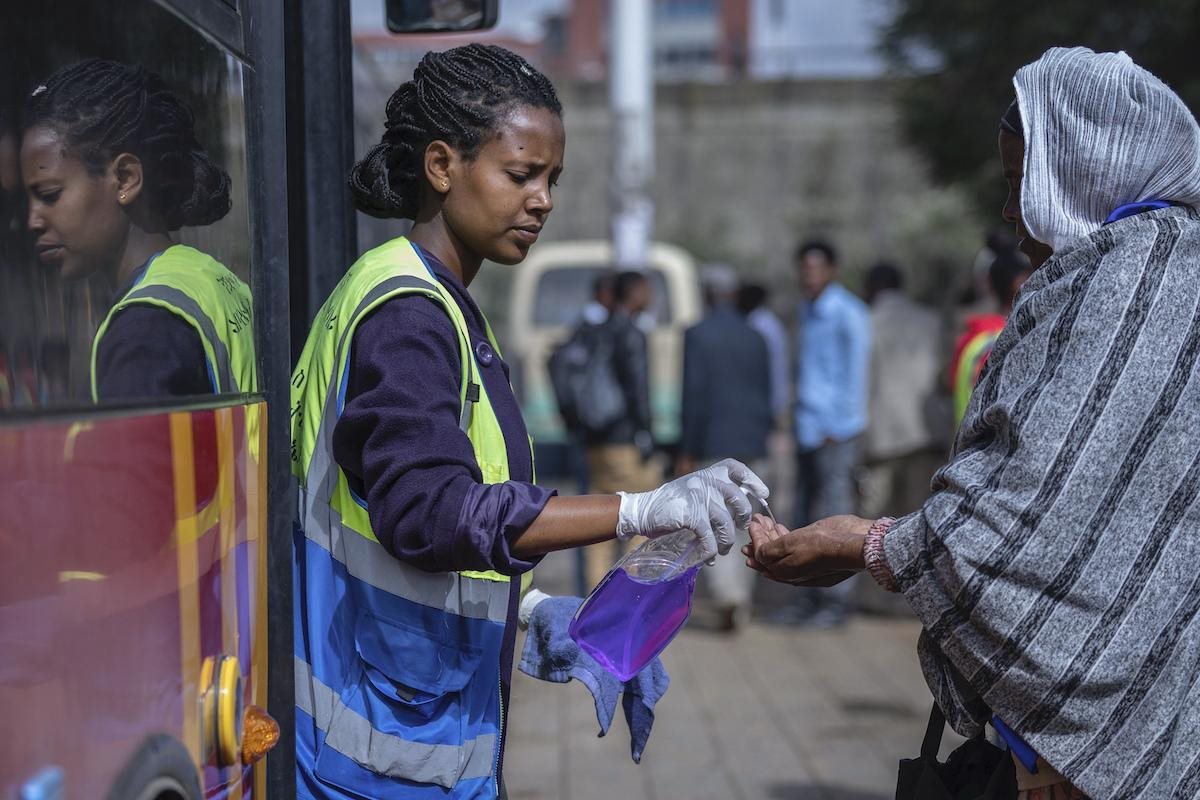Ethiopian Government on the Forefront of COVID-19
 AP PHOTO/MULUGETA AYENE
AP PHOTO/MULUGETA AYENE
As of April 14, Ethiopia has 82 cases of COVID-19 with 3 deaths and 14 recoveries.
Thousands of Ethiopian workers deported from UAE and Saudi Arabia.
The Addis Ababa city administration is facing a pressing challenge as a result of the COVID-19 pandemic. Thousands of undocumented Ethiopian workers are being abruptly deported from the United Arab Emirates (UAE) and Saudi Arabia back to Addis Ababa over the weekend in cargo planes.
The governments of both countries claimed the Ethiopians were vulnerable to the coronavirus and they have deported some with symptoms and many without — but no testing.
Ethiopia’s health minister, Lia Tadesse confirmed the mass deportation, and stated that it was undermining the nation’s effort to reduce the rising number of COVID-19 cases in Ethiopia. More than half of the confirmed cases have been recent travelers to Dubai.
“Ethiopian workers in Saudi Arabia, UAE and Djibouti are being forced to flee to their country, a situation that is becoming a challenge to contain the virus,” said Tadesse.
More than 2,870 Ethiopian migrants were deported in the last month and Ethiopia expects to receive another 3,000 citizens in the next 15 days alone, according to the minister.
An internal UN memo seen by Reuters said Saudi Arabia was expected to deport some 200,000 Ethiopian migrants in total.
“Large-scale migratory movements which are not planned make the transmission of the virus much more likely to continue," Catherine Sozi, the UN humanitarian coordinator for Ethiopia, told Reuters, “We are therefore calling for the temporary suspension of large-scale deportations.”
Containment measures taken by the government.
The authorities have closed borders, closed schools, ordered the shuttering of nightclubs and entertainment outlets, announced social distancing measures, and called in retired and in-training medical personnel. In addition, all people entering Ethiopia from another country are subject to a mandatory 14-day quarantine at designated hotels at the traveler’s expense.
The authorities postponed the elections, which were scheduled for August 29.
On April 8, the Prime Minister declared a state of emergency under Article 93 of the constitution, which allows it to impose more stringent measures.
Ethiopia is highly exposed to the shock through the large contribution of air transportation to exports: the national carrier, Ethiopian Airlines, which has the largest fleet in Africa, announced the suspension of 80 flight routes.
Flower exports to Europe have also declined significantly due to lack of demand and closure of airports on the continent. Finally, while Ethiopia benefits from lower oil prices, the prices on its main export commodities such as coffee and oil seeds have been adversely impacted by the crisis.
Fiscal measures taken by the Government.
- Ethiopia initially announced a Br 300 million (US$9 million) package to bolster healthcare spending in early March. On March 23, the Prime Minister announced the aid package would be increased to Br 5 billion (US$154 million or 0.15 percent of GDP) but details on the precise modalities of the assistance were not made available.
- On April 3, the Prime Minister’s office announced a COVID-19 Multi-Sectoral Preparedness and Response Plan, with prospective costing of interventions. The plan is to be implemented over the next three months and will require US$1.64 billion in funding. The funds are expected to be allocated as follows:
- US$635 million for emergency food distribution to 15 million individuals vulnerable to food insecurity and not currently covered by the rural and urban Productive Safety Net programme (PSNPs) – effectively extending the PSNP across the territory;
- US$430 million for health sector response under a worst-case scenario of community spread with over 100,000 COVID-19 cases of infection in the country, primarily in urban areas;
- US$282 million for provision of emergency shelter and non-food items;
- The remainder US$293 million would be allocated to agricultural sector support, nutrition, the protection of vulnerable groups, additional education outlays, logistics, refugees support and site management support.
Ethiopia is a federal country with 11 states (two of which are cities). These are divided into 916 Woredas (and city administrations in urban areas). These lowest levels of sub national government have an average population of 114,000 inhabitants. According to the World Observatory on Sub National Finance the Woreda are responsible for:
- Administration and operation of general services (non-assigned to specific functions); Civil protection; Emergency services;
- Road networks and facilities (local);
- Agriculture; Rural development; Irrigation; Support to local enterprises and entrepreneurship;
- Energy (electricity); Transport facilities (bus terminals and marketplaces); Slaughterhouse;
- Waste management (collection, treatment and disposal of waste); Sewerage (waste water management); Street cleaning; Environmental protection; Air pollution; Soil and groundwater protection; Drinking water distribution;
- Primary healthcare (medical centres); Public health service; Social welfare centres; Unemployment subsidies and benefits.
It is logical therefore that the Woreda are key to managing the emergency PSNP funds and other extra funds to ensure a quick response. According to a description of the PSNP there are two types of emergency funding: Contingency funds. These funds can be immediately released (usually as cash) to add people to the programme or increase the number of months people receive support.
A Risk Financing Facility. This fund can be rapidly released if local conditions (rainfall, for example) are extremely bad and if contingency funds are exhausted.
This local government managed system allows an active and much faster response by Government than the traditional emergency response. It can be used at any time (rather than waiting for the usual annual humanitarian appeal). Neither instrument requires an anxious period of passive “waiting-and-seeing” if any donors decide to help. Ethiopia has used this existing system to accelerate its COVID19 response.
In addition of all these measures, the central bank has provided Br 15 billion (US$450 million) of additional liquidity to private banks to facilitate debt restructuring and prevent bankruptcies.